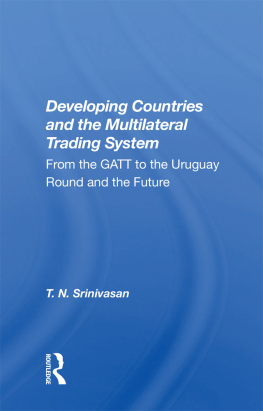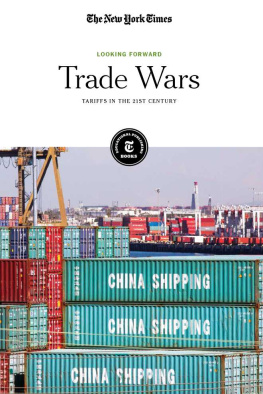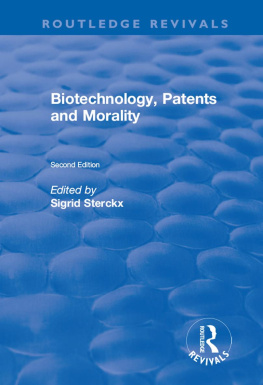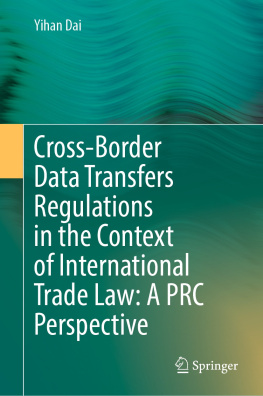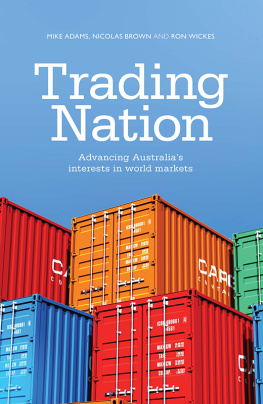Developing Countries and the Multilateral Trading System
Developing Countries and the Multilateral Trading System
From the GATT to the Uruguay Round and the Future
T. N. Srinivasan
First published 1998 by Westview Press
Published 2018 by Routledge
52 Vanderbilt Avenue, New York, NY 10017
2 Park Square, Milton Park, Abingdon, Oxon OX14 4RN
Routledge is an imprint of the Taylor & Francis Group, an informa business
Copyright 1998 Taylor & Francis
All rights reserved. No part of this book may be reprinted or reproduced or utilised in any form or by any electronic, mechanical, or other means, now known or hereafter invented, including photocopying and recording, or in any information storage or retrieval system, without permission in writing from the publishers.
Notice:
Product or corporate names may be trademarks or registered trademarks, and are used only for identification and explanation without intent to infringe.
A CIP catalog record for this book is available from the Library of Congress.
ISBN 13: 978-0-367-00989-2 (hbk)
In summer 1995, I was invited by the Economic Development Institute (EDI) of the World Bank to write a paper on the external environment for the developing countries following the conclusion of the Uruguay Round of Multilateral Trade Negotiations in April 1994. As I began my research, I found myself increasingly drawn to the tussle between the opposing ideas of insulation from and integration with the world economy in the developing countries, both in their attitudes toward and actions in the General Agreement on Tariffs and Trade (GATT) as well as in their role in successive rounds of multilateral trade negotiations (MTNs) sponsored by the GATT. This book is the result. It places the agreement at the Uruguay Round in historical perspective. Its focus is on the interaction between the developed and developing countries on matters relating to the global trading system and its disciplines since the founding of GATT.
I thank Isabel Guerrero, Jayanta Roy, and Vinod Thomas for inviting me and providing a friendly, hospitable, and stimulating environment at the EDI for my research. I thank Michael Finger, Isabel Guerrero, Bernhard Gunter, Bernard Hoekman, Robert Hudec, Anne Krueger, Philip Levy, Will Martin, Jayanta Roy, Vinod Thomas, and Alan Winters for their valuable comments on an earlier draft. I am grateful to Sanjay Desilva, Vandana Sipahimalani, and Beata Smarzynska for carefully editing the manuscript and for research assistance. My debts to my secretary, Louise Danishevsky, are too numerous to enumerate here.
I am grateful to the World Bank, the Ford Foundation (under Grant 950-1341 to the Economic Growth Center, Yale University), and the Center for Research on Economic Development and Policy Reform at Stanford University (where was written) for financial support.
None of the commentators and research assistants are responsible for the views expressed in this book. The findings, interpretation, and conclusions are entirely mine and should not be attributed in any manner to the World Bank, to its affiliated organizations, or to members of its board of executive directors or to the countries they represent. The same disclaimer applies with respect to the Ford Foundation, the Center for Research on Economic Development and Policy Reform of Stanford University, and the Economic Growth Center of Yale University.
T. N. Srinivasan
- AD antidumping
- ADD antidumping duty
- ADE Asian developing economies
- ADM antidumping measures
- APEC Asia-Pacific Economic Cooperation
- APFTA Asia-Pacific Free Trade Area
- ASEAN Association of Southeast Asian Nations
- ATC Agreement on Textiles and Clothing
- BEM big emerging markets
- BOP balance of payments
- CCH cross-country intraindustry
- CEPAL UN Commission for Latin America
- CMEA Council of Mutual Economic Assistance
- CTG Council on Trade in Goods
- CU customs union
- DS dispute settlement
- DSB Dispute Settlement Body
- DSM dispute-settlement mechanism
- DSU Dispute Settlement Understanding
- EC European Community
- ECOSOC Economic and Social Council
- EFTA European Free Trade Area
- EU European Union
- FDI foreign direct investment
- FTA free trade area
- G-7 Group of Seven
- GATS General Agreement on Trade in Services
- GATT General Agreement on Tariffs and Trade
- GF Group of Forty
- GN Group of Nine
- GNS Group of Negotiations on Services
- GSP Generalized System of Preferences
- GT Group of Ten
- HIC high-income countries
- ILO International Labor Organization
- IMF International Monetary Fund
- IT information technology
- ITO International Trade Organization
- MERCOSUR Preferential Trade Arrangement Between Argentina, Brazil, Paraguay, and Uruguay
- MFA Multifibre Arrangement
- MFN most favored nation
- MITI Ministry of International Trade and Industry
- MTN Multilateral Trade Negotiation
- NAFTA North American Free Trade Area
- NT National Treatment
- NTM nontariff measure
- OECD Organization for Economic Cooperation and Development
- PTA preferential trading arrangement
- QR quantitative restriction
- ROOs rules of origin
- RTA regional trading agreement
- SAL structural adjustment loan
- SAPTA South Asian Preferential Trade Area
- SECAL sectoral adjustment loan
- SGA safeguards agreement
- SGM safeguard measure
- TAFTA Transatlantic Free Trade Area
- TMB Textiles Monitoring Body"
- TNC Trade Negotiating Committee
- TRIMs Trade-Related Investment Measures
- TRIPs Trade-Related Intellectual Property Rights
- UN United Nations
- UNCTAD United Nations Conference on Trade and Development
- UNDP United Nations Development Program
- UR Uruguay Round
- VER voluntary export restraints
- VIE voluntary import expansion
- WHO World Health Organization
- WIPO World Intellectual Property Organization
- WTO World Trade Organization
The Uruguay Round (UR) of the multilateral trade negotiations (MTNs), the latest, eighth, and most ambitious of a series of such negotiations, was formally concluded with the signing on April 15, 1994, at Marrakech, Morocco, of the Final Act, which embodies all the multilateral and plurilateral agreements of the round. The first round, held in Geneva in 1947, resulted in the General Agreement on Tariffs and Trade (GATT). The UR agreements extended multilateral rules and disciplines to trade in services, trade-related aspects of intellectual property rights, and investment measures. They also brought trade in agriculture and textiles back into the GATT. The Final Act included the decision to establish a formal organization called the World Trade Organization (WTO) "to provide the common institutional framework for the conduct of trade relations among its members in matters related to the (Uruguay Round) agreements" (GATT 1994: 6). Ministers representing the 124 governments and the European communities that participated in the UR affirmed in their declaration at the signing of the Final Act "that the establishment of the World Trade Organization (WTO) ushers in a new era of global economic cooperation, reflecting the widespread desire to operate in a fairer and more open multilateral trading system for the benefit and welfare of their peoples" (GATT 1994: iv).

